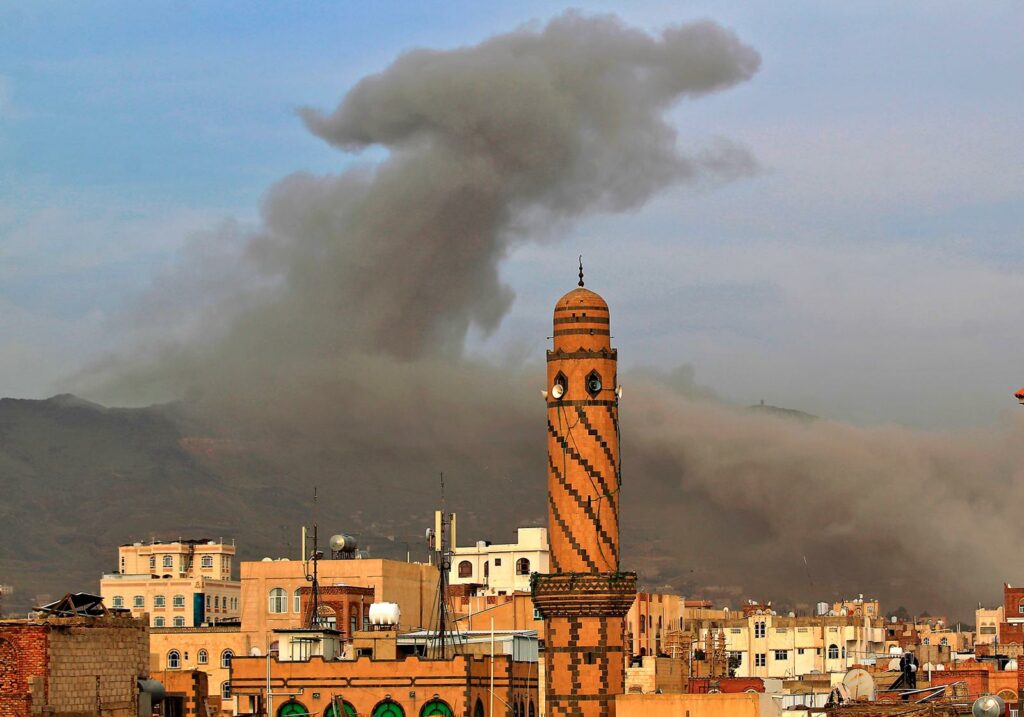Biden and Yemen – what does it mean for Bahrain?
By: Ethan Sykes*
On 4th February Joe Biden announced an end to US support for Saudi Arabia’s war in Yemen. This is a welcome step in attempts to bring an end to a conflict which has caused approximately 233,000 deaths. However, this also has potentially momentous consequences for the region as a whole.
Saudi Arabia has long been a key American ally in the Middle East with thousands of American troops based there along with fighter jets and Patriot missile defense batteries. Moreover, Yemen is considered by the Saudis as a key area of concern. Consequently, the decision to withdraw support from Saudi Arabia in this area of foreign policy raises questions about whether this heralds the beginning of an American climbdown in the Middle East.
It should be emphasised this does not mean Biden is consciously planning on withdrawing from the Middle East. More likely it simply highlights a change in priorities that will lead to an increasingly reduced American focus on the region. Certainly, any change in American policy will be gradual but this does not make it any less consequential.
If America were to slowly begin withdrawing from the Middle East this could mean it becomes more willing to challenge its allies on their human rights record. Indeed, American policymakers might increasingly come to see this as necessary if they are to have any credibility when claiming to stand for human rights, freedom, and democracy against an autocratic and repressive China. As well as this, countries like Saudi Arabia and Bahrain may become concerned they are losing their vital ally. This could lead them to look more favourably on reforms in order to placate America and to retain its support for as long as possible. There is some evidence to support this possibility in that in recent years Saudi Arabia has implement some limited reforms and this was partly motivated by a desire to improve the monarchy’s relationships abroad. This indicates that as criticism for Saudi Arabia grows it is possible further, more consequential, reforms may be implemented.
Unfortunately, as America continues to withdraw from the Middle East it seems likely that at some point Bahrain and Saudi Arabia will contemplate other options. This is because it will become clear that regardless of the amount of reform enacted they are unlikely to retain the amount of support they currently receive. Alternatively, they may decide the reforms necessary to secure support are beyond what they are a step too far. Either way the logical strategy in this scenario would be to seek a new ally, ideally one less concerned about their human rights record – China. This would likely worsen the long term human rights prospect in countries such as Bahrain and Saudi Arabia given China would be unlikely to exert pressure to improve human rights.
In conclusion, Biden’s decision to withdraw support for the Saudi war in Yemen may become the first move towards a reduced American focus on the Middle East and Saudi Arabia. This, in turn, could result in a brief window of opportunity for an improvement of democracy and human rights in the Middle East as America’s allies attempt to retain its support. Eventually though, it seems likely they will be forced to seek other allies which will be unconcerned about human rights and democracy leading to a reversal of any gains made.
Consequently, President Biden and future American administrations should make clear to its Middle Eastern allies that they will continue to remain key allies in the future. However, this should be conditional on real and measurable improvements in democracy and human rights.
Bibliography:
Barbara Starr, “Saudi Arabia has paid $500M toward the cost of US troops in country”, CNN Politics, Jan 17, 2020. Accessed Feb 9, 2021, https://edition.cnn.com/2020/01/16/politics/saudi-arabia-us-troops-payment/index.html
Darwich, Mary. “The Saudi intervention in Yemen: struggling for status”, Insight Turkey, 20 no.2 (2018) 125-142. Accessed Feb 10, 2021, https://www.jstor.org/stable
Priyanka Boghani, “The paradox of Saudi Arabi’s social reforms”, PBS Frontline, Oct 1, 2019. Accessed Feb 10, 2021, https://www.pbs.org/wgbh/frontline/article/the-paradox-of-saudi-arabias-social-reforms/
United Nations. “UN humanitarian office puts Yemen war dead at 233,000, mostly from ‘indirect causes’”. UN News, Dec 1, 2020. Accessed February 9, 2020, https://news.un.org/en/story/2020/12/1078972
The White House. “Remarks by President Biden on America’s place in the world”. The White House. Feb 04, 2021. Accessed February 9, 2021, https://www.whitehouse.gov/briefing-room/speeches-remarks/2021/02/04/remarks-by-president-biden-on-americas-place-in-the-world/
* Ethan Sykes, Researcher – Salam for Democracy and Human Rights
1 “Remarks by President Biden on America’s place in the world’, The White House, Feb 4, 2021. Accessed Feb 9, 2021, https://www.whitehouse.gov/briefing-room/speeches-remarks/2021/02/04/remarks-by-president-biden-on-americas-place-in-the-world/
2 “UN humanitarian office puts Yemen war dead at 233,000, mostly from ‘indirect causes’”, UN News, Dec 1, 2020. Accessed Feb 9, 2021, https://news.un.org/en/story/2020/12/1078972
3 Barbara Starr “Saudi Arabia has paid $500M toward the cost of US troops in country” CNN Politics, Jan 17, 2020. Accessed Feb 9, 2021, https://edition.cnn.com/2020/01/16/politics/saudi-arabia-us-troops-payment/index.html
4 May Darwich, “The Saudi intervention in Yemen: struggling for status, Insight Turkey 20, no.2 (2018) 125-142, accessed Feb 10, 2021, https://www.jstor.org/stable
5 Priyanka Boghani, “The paradox of Saudi Arabia’s social reforms”, PBS Frontline, Oct 1, 2019. Accessed Feb 10, 2021, https://www.pbs.org/wgbh/frontline/article/the-paradox-of-saudi-arabias-social-reforms/


 العربية
العربية Français
Français Deutsch
Deutsch